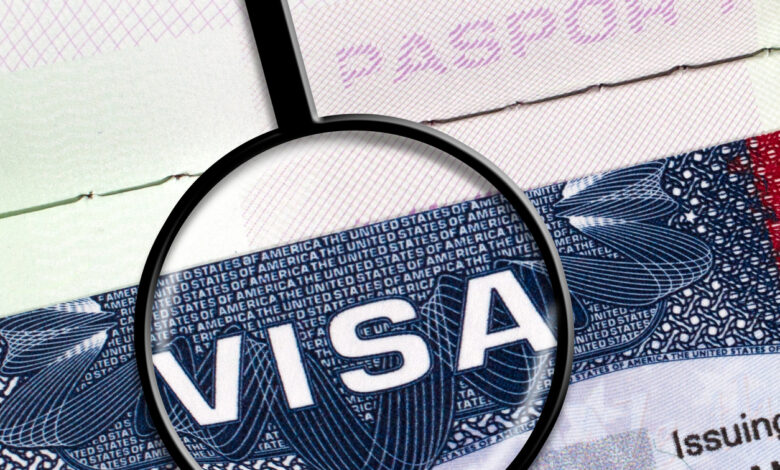Top Reasons for Student Visa Rejection [2024]

Introduction
Studying abroad is an exciting adventure full of hopes and dreams. It’s a way to get a top-notch education, learn about other countries, and create connections worldwide. Getting a student visa, which is a significant step, is often too complicated for many people. Visa rejections can be disappointing. It can happen because visa applications are hard to understand, and countries have strict rules about what they will accept. Figuring out why these applications were turned down is crucial for figuring out what went wrong and making future applications that are better and more convincing.
This blog discusses the most common reasons why student visa applications are turned down and gives tips on how potential students can improve their chances of acceptance. Every part of the decision-making process is essential, from financial proof to school records, interview prep, and having the correct paperwork. We hope to help students navigate the confusing visa application process by shedding light on these areas. This will help them avoid common problems and reach their goal of going to study abroad.
What is a Student Visa?
A student visa is a special kind of visa for people who want to attend college in a different country. The official permission from the host country lets the international student live and study in that country for the length of their program. Getting a student visa is very important for international students because it proves that they are students in the host country and lets them do academic activities like attending classes, doing internships related to their field of study, and sometimes working part-time.
A student visa is broken down into groups based on the length of the study program and the level of education (for example, bachelor’s, graduate’s, or doctoral studies). Each country has its rules, requirements, and application process for student visas. These are based on the country’s immigration policies and the needs of international students. Usually, people who want a student visa have to prove that they have been accepted into a recognized college, have enough money to pay for their stay, and meet health and character standards.

Applying for a Student Visa
Documents required to apply for a student visa include financial statements, passport photos, confirmation of acceptance from the educational institution, and occasionally evidence of language proficiency. In addition, as part of the application process, candidates are frequently required to participate in an interview where they must provide detailed explanations of their intended studies, the reasons they wish to study in the host country, and their intentions to return home upon completing their studies.
In addition to facilitating the pursuit of education abroad, a student visa exposes the student to new cultures, languages, and perspectives, enriching their life experience. This institution serves as an entry point to worldwide learning, allowing students to cultivate their scholarly, vocational, and personal growth within a global context.
Main Reasons for Student Visa Rejection
- Inadequate Financial Proof: Proof of adequate financial resources to cover tuition and living expenses is mandated by embassies. Insufficient evidence to support one’s financial capability is a frequent ground for visa denial. It goes beyond merely demonstrating equilibrium; it must also substantiate its durability and steadfastness.
- Poor Academic Record: Visa officials closely examine academic performance to assess the integrity of applicants’ commitment to education. A record of inconsistent academic performance and subpar grades casts doubt on the applicant’s dedication and probability of success in international educational settings.
- Inconsistencies in Application: Each detail is vital. Inconsistencies between application forms and corroborating documents may engender suspicion, ultimately culminating in denials. Maintaining transparency and precision is of utmost importance.
- Lack of Language Proficiency: Command of the language of instruction is vital, particularly for non-English-speaking nations. A sufficient performance on language proficiency assessments may impede the progress of your application, indicating possible challenges in acclimating to scholarly settings.
- Insufficient Ties to Home Country: Embassies seek assurance that applicants will return home after their studies. Weak ties to the home country, such as lack of family, property, or job prospects, can result in visa denial.
- Incomplete Application: Embassies seek assurances that applicants will return home following their studies. Visa denials may result from tenuous ties to the country of origin, including an absence of family, property, or employment opportunities.
- Incorrect Visa Category: Inaccurate visa category selection may result in immediate disqualification. Recognize the distinctions and ensure that your application corresponds to the academic program you intend to pursue.
- Lack of Interview Preparation: Interviews are an essential component of the hiring procedure. Adverse outcomes may ensue when anxiety or lack of preparation leads to subpar performance. Rehearse responses to frequently asked inquiries and deliver them with assurance.
- Health and Character Requirements: Visa denials may be justified based on prior criminal convictions or specific health conditions. Transparency and the provision of required documentation are essential for navigating this aspect.
- Fraudulent Documentation: The submission of forged or altered documents is a grave transgression that may incur permanent prohibitions and visa denial. Documents should always be authentic and verifiable.
- Plan of Study: A realistic and unambiguous study schedule demonstrates your diligence and forethought. Intentional or impertinent academic objectives may raise suspicion among visa officers.
- Visa History: A visa denial or overstay history may harm one’s credibility. Be prepared to provide straightforward and truthful explanations for any visa-related concerns.
- Economic Conditions of Home Country: To some extent, visa decisions may be influenced by the economic instability of the applicant’s native country, which may indicate the probability of their return.
Check out a free online course to improve your English Speaking skills.
Tips to Avoid Visa Rejection for Studying Abroad
Understanding and managing the visa application process can increase your chances of acceptance. To help you get your visa approved and get closer to your goal of learning in another country, here are some essential tips:
- Start Early: Start the visa application process in advance. This gives you plenty of time to get all the papers you need, deal with any problems that may come up, and avoid the stress of having to turn in things at the last minute.
- Ensure Your Passport is Valid: After the end of your study program, your passport should have at least six months left on it. Check your passport’s expiration date early and update it if necessary.
- Understand Visa Requirements Thoroughly: Each country has different visa standards and application methods. Read the embassy or consulate’s instructions carefully to ensure you know what to do. If you need clarification on something, get it cleared by government sources or an experienced education consultant.
- Provide Complete and Accurate Documentation: Visa applications that need to be completed are often turned down. Make sure that all of the necessary documents are included, filled out correctly, and sent in the right way. Pay close attention to things like names, dates, and addresses to ensure the paper is consistent.
- Demonstrate Financial Stability: You must show that you have enough money to pay for your fees and living costs while you are in college. To do this, you should get clear and detailed financial papers like bank statements, scholarship awards, or sponsorship letters.
- Show Academic Preparedness: Include all important academic transcripts, certificates, standardized test scores (if applicable), and letters of acceptance from the college to show that you are qualified academically and ready for the course.
- Establish Strong Ties to Your Home Country: Visa agents must know that you plan to return home after college. This claim can be backed up by strong family, social, or business ties to your home country. This can include things like job offers, deeds to land, or family duties.
- Prepare for the Interview: If you have to go to an interview as part of the visa application process, think about the questions that might be asked and practice answering them. Be sure that your answers are clear, honest, and confident. Focus on your educational goals, why you chose that particular country and college, and your plans after you finish college.
Explore free online courses to improve your knowledge and skills and prepare better for interviews.
- Avoid Fraudulent Documentation: Sending in fake papers can get you kicked out immediately and in the future. Make sure that everything you send in is real and can be verified.
- Consult With Experts: Seek guidance from immigration specialists or education counselors who possess expertise in the field of student visas. In addition to reviewing your application for potential flaws, they can offer guidance derived from their knowledge of successful applications in the past.
By using these tips and putting in the time and effort needed, you can improve your chances of getting a visa and make your dream of studying abroad come true. Remember that getting ready and paying attention to details is crucial for getting a student visa.
Unlock the door to global education by exploring our Study Abroad Programs.
Conclusion
Although obtaining a student visa is difficult, it is entirely feasible. Visa applicants can substantially improve their approval prospects by comprehending and confronting the leading causes of rejection. Thorough preparation, meticulous attention to detail, and a proactive approach to potential application vulnerabilities are essential. Whether through bolstering financial documentation, enhancing academic records, meticulously preparing for the interview, or verifying the completeness and accuracy of all paperwork, every stride brings one closer to attaining one’s educational objectives overseas.
Remember that rejection is merely a learning occasion that can be utilized to return more robust. Undertaking the aspiration of studying abroad is feasible with diligence, appropriate readiness, and an optimistic frame of mind. Those who have encountered rejection should view it as a learning opportunity rather than a setback. Analyze the justifications, seek advice, and reapply with a more compelling and robust application. The educational landscape is expansive and teeming with prospects; by adopting the appropriate strategy, one can surmount the obstacles and triumph in pursuing a global education.
FAQs
Insufficient financial proof is often cited because consulates must ensure that students can cover their tuition fees, living expenses, and other costs while studying abroad. Failure to provide credible financial statements or evidence of sufficient funds can lead to visa denial.
Visa officers assess applicants’ ties to their home country to evaluate the likelihood of their return after completing their studies. Weak ties, such as lack of family, employment, or property, might indicate a higher risk of the applicant not returning, leading to visa rejection.
Choosing a program or institution that doesn’t align with your previous studies or career goals or seems unaccredited can raise suspicions about the genuineness of your intent to study. Visa officers look for consistency and credibility in your academic and career plans.
Poor academic records can be a red flag for visa officers, who may doubt the applicant’s ability to succeed in an academic environment abroad. Explaining any extenuating circumstances that might have affected past academic performance is crucial.
Yes, incomplete application forms or missing documents can result in immediate rejection. It’s vital to carefully review visa application requirements and provide all requested documentation in the specified format.
A poor interview performance, such as failing to answer questions confidently, inconsistently, or providing false information, can lead to visa rejection. The interview assesses the applicant’s credibility, intent to study, and plans post-study.
A criminal background can lead to visa rejection due to concerns over the applicant’s character and the potential risk they may pose while residing in the country. Transparency and legal documentation explaining the situation may be required.
Applying late can lead to delays and possibly missed enrollment deadlines, negatively impacting the visa application. Visa processing times can vary, so it is recommended that you apply as early as possible to avoid any complications.





